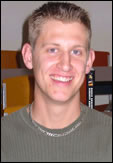|
"To showcase the
ingenuity of Canadian engineering students while providing
an enjoyable opportunity to network and develop professional
skills."
Powerful, isn't it? This is the mission statement of the
Western Engineering Conference and Competition, which takes
place Jan. 22-26 at the University of Alberta - the third
time since 1985 that the WECC has visited Edmonton.
WECC, an annual competition of delegates from Western Canadian
universities, is in its 19th year and boasts attendance of
more than150 delegates from eight universities. Completely
student organized and operated, the conference is overseen
by the Western Engineering Student Society Team and the Canadian
Federation of Engineering Students.
WECC's roots go back to the late 1960s when Canadian engineering
students began regional conferences to discuss issues. In
1967 the first Western Canadian Congress of Engineering Students
was held, but it wasn't until 1980 that Queen's University
in Kingston, Ont., held the first design competition.
Other regions soon followed suit with their own competitions,
and in January 1984 delegates from across Canada voted to
hold a national conference. This conference, which officially
began in 1985, brought together participants who excelled
at regional competitions in Western Canada, Ontario, Quebec
and Atlantic Canada. The first Western Engineering Design
Competition was held in 1985, at the University of British
Columbia.
As the demand for varying communication skills grew in the
working world, the competition introduced new challenges in
communication and debate. In 1990 the term design was dropped
and the conference and competition were merged into what we
know today as the Western Engineering Conference and Competition.
The conference component of WECC has been running for 35 years.
It brings together delegates to discuss relevant issues affecting
both their universities and industry itself. This year the
focus will be "to discuss current problems faced by industry
and its relation to society, to explore the applicability
of competition skills to industry work, and to improve non-technical
skills," says the WECC 2003 website.
The competition element of WECC is made up of seven categories,
all with a focus on problem solving, presentation skills and
real-life situations. The theme for this year's competition
and conference is Innovation and Exploration, which truly
describes the intention and focus of the coming gathering.
In his letter of endorsement the Hon. Victor Doerksen, Alberta's
minister of innovation and science, promotes WECC. "Through
the Western Engineering Conference and Competition 2003, future
leaders in science can supplement their classroom learning
as they grow into highly skilled employees," Mr. Doerksen
says. "Likewise, the conference will provide opportunities
for forward-thinking companies to meet the best and brightest
engineering students in the west."

U of A WECC DELEGATES
Louis Bezuidenhout
Laurel Cooper
Candice Heron
Padet Khosathit
Brian Lau
Loren Parfitt
Anton Schernus
Vikran Sierra
Gary Wicentowich

SPONSORSHIP INFORMATION
Phone Wayne Poon
at (780) 439-2644
e-mail: sponsorship@wecc2003.wesst.ca
visit http://wecc2003.wesst.ca

COMPETITION CATEGORIES
Editorial Communication
Delegates discuss the impact that
a current technological issue has within our society.
Explanatory Communication
The goal for delegates is to take a complicated issue,
and discuss it in terms that the general public can understand.
Corporate Design
Teams employ their ingenuity to take on a problem within society
and devise a feasible solution to it.
Entrepreneurial Design
Teams find a need, and design a new product or service not
already available.
Extemporaneous Debate
Delegates are faced with the challenge of presenting their
viewpoint on an issue with minimal preparation time.
Junior Team Design
A team of four is given materials, a few hours and a problem.
Best idea and presentation takes home the prize.
Senior Team Design
A similar endeavor to the junior team design, but different
in the fact that the problem is more difficult and teams are
given 10-15 hours to complete their design and presentation.

|



